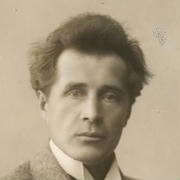Jean Sibelius ( sib-AY-lee-əs; Finland Swedish: [ˈjɑːn siˈbeːliʉs, ˈʃɑːn -] (listen); born Johan Julius Christian Sibelius, 8 December 1865 – 20 September 1957) was a Finnish composer and violinist of the late Romantic and early-modern periods. He is widely recognized as his country's greatest composer, and his music is often credited with having helped Finland develop a national identity during its struggle for independence from Russia.
The core of his oeuvre is his set of seven symphonies, which, like his other major works, are regularly performed and recorded in Finland and very many other countries. His other best-known compositions are Finlandia, the Karelia Suite, Valse triste, the Violin Concerto, the choral symphony Kullervo, and The Swan of Tuonela (from the Lemminkäinen Suite). Other well known works include pieces inspired by nature, Nordic mythology, and the Finnish national epic, the Kalevala, over a hundred songs for voice and piano, incidental music for numerous plays, the opera Jungfrun i tornet (The Maiden in the Tower), chamber music, piano music, Masonic ritual music, and 21 publications of choral music.
Sibelius composed prolifically until the mid-1920s, but after completing his Seventh Symphony (1924), the incidental music for The Tempest (1926) and the tone poem Tapiola (1926), he stopped producing major works in his last thirty years, a stunning and perplexing decline commonly referred to as the "silence of Järvenpää", the location of his home. Although he is reputed to have stopped composing, he attempted to continue writing, including abortive efforts on an eighth symphony. In later life, he wrote Masonic music and re-edited some earlier works, while retaining an active but not always favourable interest in new developments in music.
The Finnish 100 mark note featured his image until 2002, when the euro was adopted. Since 2011, Finland has celebrated a flag flying day on 8 December, the composer's birthday, also known as the "Day of Finnish Music". In 2015, in celebration of the 150th anniversary of the composer's birth, a number of special concerts and events were held, especially in Helsinki, the Finnish capital.















































